Reviews and Costs of Crowns, Dentures, and Bridges in Turkey
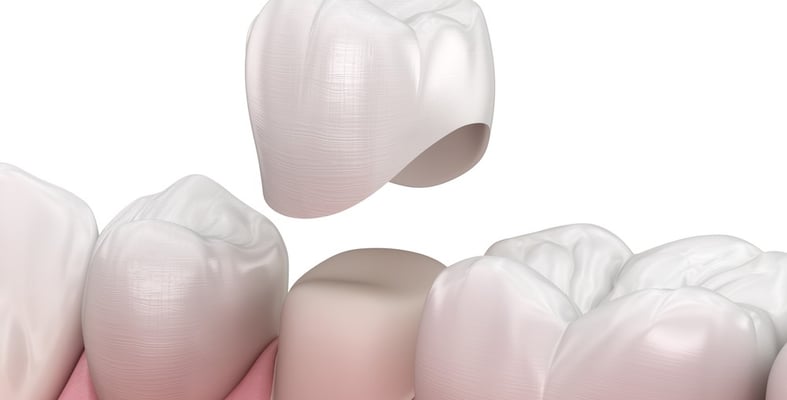
Dental Crown & Bridges is the ideal solution for treating dental caries or fractures, in addition to a beautiful smile.We will learn how to place dental crowns and bridges, and their types and costs in Turkey
Table of Content
Dental crown and bridge
A dental crown is a cap or cover that covers the entire visible part of a weak or damaged tooth. It binds the tooth together, which provides it with strength and prevents further fracture, allowing it to eat normally and protect the teeth from infections.
A crown restores a tooth to its normal shape, size, and function, and a crown can make a tooth stronger or improve its appearance.
Bridge and crown front teeth
Crowns and bridges of the front teeth are crowns or bridges of the anterior visible teeth of the mouth.
And it requires special considerations compared to the crowns of the back of the mouth, due to the appearance and aesthetics are of the greatest importance.
Front teeth often have different shades of color, and that differs from person to person.
At Ilajak Medical, we make sure to match the color shades of all crowns accurately with each tooth, so that they fit perfectly with the rest of the teeth.
With the help of our complete and integrated team, we can prepare crowns for the front teeth with the latest means by the most skilled dentists.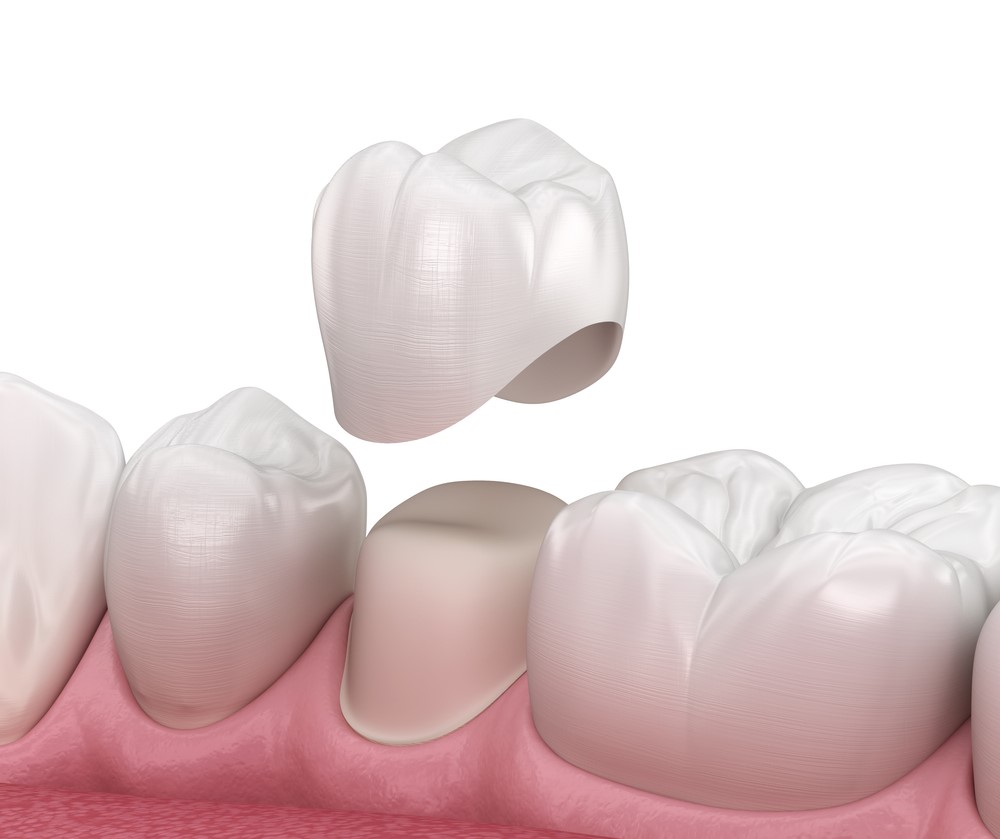
Crowns for kids
Dental crowns for children usually ends in one visit, and usually stays until the tooth falls, at twelve years of the child's age.
For children, a crown can be used on the primary (deciduous) teeth to:
- Preserve the severely damaged tooth from caries; It cannot withstand fillings.
- Protecting the teeth of children who are at risk of developing tooth caries, especially when the child has difficulty maintaining daily oral hygiene.
- Reducing the frequency of general anesthesia for children who are unable to fully cooperate with the requirements of appropriate dental care, due to age, behavior, or medical history.
Tooth crown procedure
The methods are divided into two main ones, the traditional, and the one-day procedure, and we will learn about the steps of each:
- The traditional procedure, need to visit the dentist twice.
- The dentist examines the tooth that needs the crown and prepares it. This may involve X-rays of the teeth and may include taking a cast of the tooth.
- The dentist removes the outer layer of the tooth.
- It takes an impression of trimmed and surrounding teeth.
- The dentist will place a temporary crown on the tooth to protect it.
- The impression is sent to the laboratory, which in turn creates the crown, and this step may take several weeks.
- After the crown is ready, on the next visit, the dentist will be able to place the crown on the tooth.
- One day procedure:
In the one-day procedure, you can skip thetemporary crown step.
- The dentist takes digital pictures of your mouth.
- Using the digital scanning of the images, the dentist creates the crown in the clinic. You may have to wait for about an hour to two hours for the crown to be made.
- Once the crown is ready, it is bonded to the desired tooth, and the entire process takes about two to four hours.
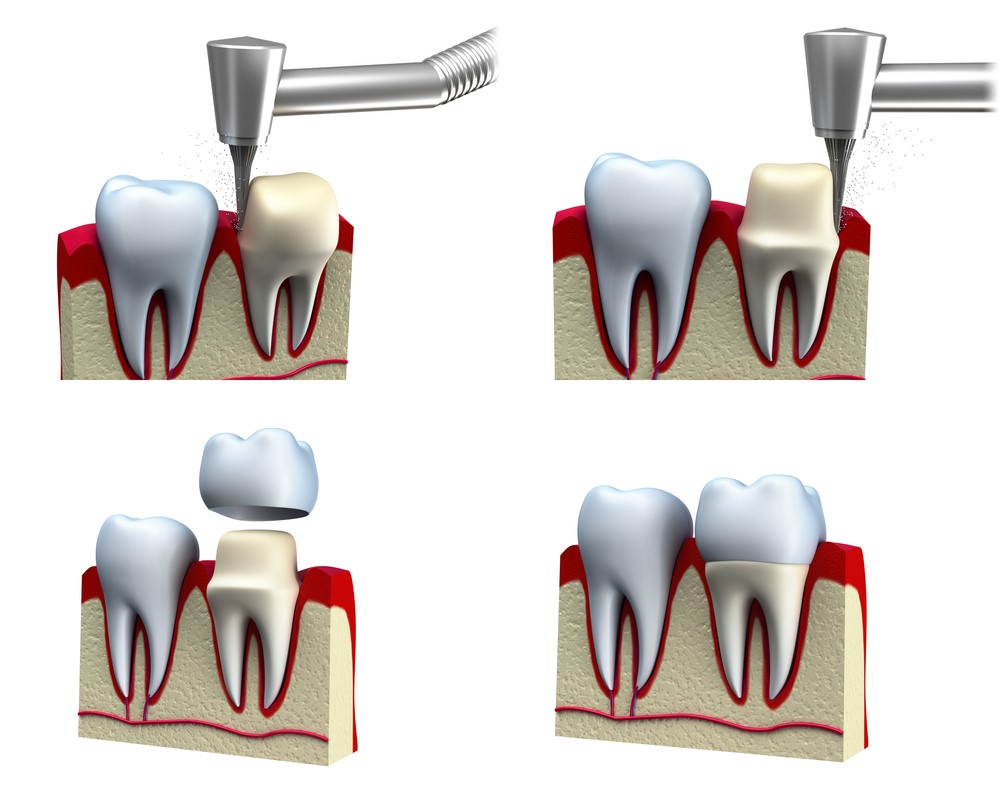
Dental crown replacement
An old crown can rarely be saved or reused since it will typically need to be cut into sections as it is removed from the tooth.
For your comfort, the tooth and the gum tissue will be numbed with a local anesthetic during this process, crowns are sometimes replaced for cosmetic reasons and oftentimes to preserve the health of the tooth after they become worn or gum tissue recedes.
Cracked tooth crown
In certain situations, your dentist will recommend a crown; here are the most common reasons:
- A broken or chipped tooth – For a cracked molar without root damage to the tooth, a crown can protect the nerves and restore normal chewing.
- A crown may also be used to repair a front tooth.
Teeth whitening and crowns
Whitening treatments do not affect crowns, it only affects natural teeth, and it does not damage dental restorations like crowns and veneers because they are made of extremely strong materials and highly resistant to bleach.
Different types of dental crowns
When a dental crown is needed, we start thinking about the types of crowns and if it suits us.
Today, many types of crowns available vary according to materials, cost, procedures, and patient needs.
According to the materials used to make the crown and bridge, can be made from:
- Golden crowns
Gold crowns are a mixture of copper and other metals, such as nickel or chromium. The main advantage of golden crowns is their strength and durability.
- Fully ceramic crowns
The most common type of crowns nowadays, as they are made entirely of porcelain.
- Porcelain fused to metal (PFM)
Porcelain and metal crowns are another widely used type of dental crown; It provides both strengths (due to its metallic structure) and aesthetic (due to the porcelain layer covering the cover).
- Zirconium crowns
Zirconia is a relatively new material, which combines the strength of metal with the aesthetics of ceramic crowns. Zirconia has become highly transparent, and layered zirconium crowns have recently become a more popular choice.
- E-max: lithium disilicate crowns
The newest type of crown in dentistry today is known as E-max, it is a type of all-ceramic crown made of lithium disilicate (it is also light and thin).
With our integrated team, Ilajak Medical provides all the appropriate crowns with the latest means by the most skilled doctors.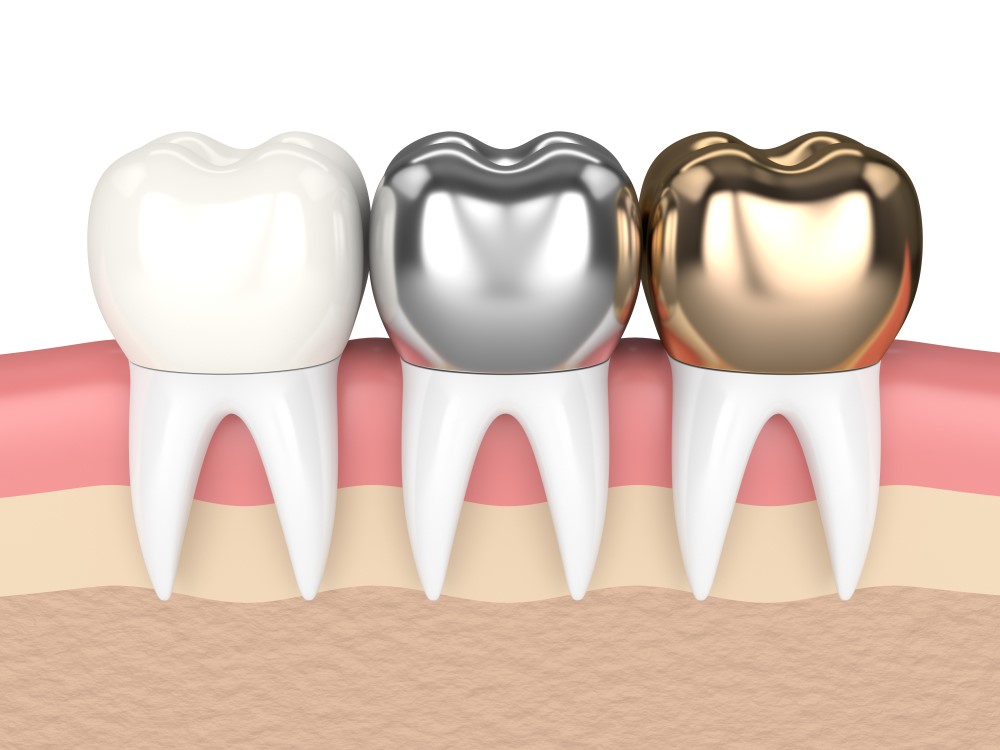
Ceramic crown teeth
A crown made entirely of ceramic usually consists of porcelain, or any other type of ceramic, as with all materials, and is placed over a prepared tooth to restore its appearance, shape, or structure.
These crowns are ideal for restoring the front teeth; Because it is transparent, and resembles natural teeth.
All-ceramic crowns are the best aesthetic option you can have today.
This is the most popular type of crown used nowadays, as it is made entirely of porcelain.
Porcelain and metal crowns (PFM) are another widely used type of dental crown; It provides both strengths (due to its metallic structure) and aesthetic (due to the porcelain layer covering the cover).
Thanks to our complete and integrated team, we can provide any porcelain dental crown with the latest technology that satisfies our valued customers.
Temporary crown dental
A temporary dental crown is a tooth-shaped covering that protects the natural tooth or implant until a permanent crown is made and held in place.
Because temporary crowns are more sensitive than permanent crowns, it is important to use caution with flossing or chewing while a temporary crown is in place.
The temporary crown is used for:
- Protect the natural tooth (or implant site) and gums.
- It allows you to smile naturally without a gap.
- Reduces tooth or gum sensitivity.
- It maintains the correct spacing between your teeth.
- It helps you chew and eat.
- The dentist helps evaluate how the crown is functioning.
A temporary crown might cover an implant, a tooth that underwent a root canal treatment, or a tooth that was treated.
It can be used for any tooth on its own, or it can be a bridge over more than one implant or tooth.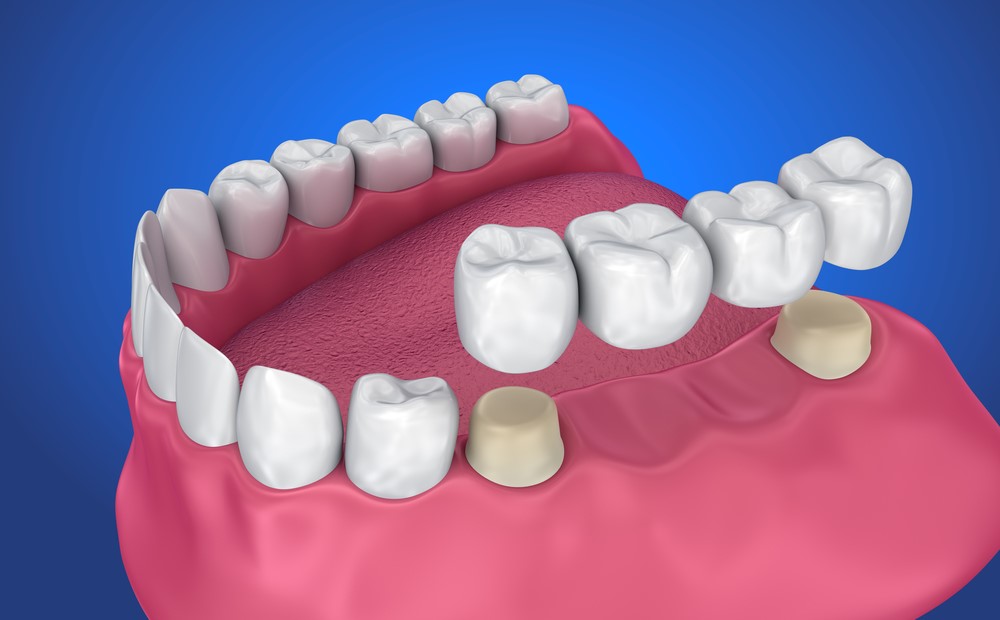
Dental crown cost in Turkey
The prices are ambiguous and not clear, for many reasons, the most important is the difference in the condition from person to another, the difference in the treatment plan, in addition to the manufacturing material, as well as the manufacturing country, however, it can be said that the prices of dental crown and bridges in Turkey start from one hundred and thirty-five Euro per tooth for single zirconium crown, while prices start from 100 euros per tooth for a single porcelain crown.
After dental crown and bridge
The validity of the dental crown or bridge can extend for fifteen years, and a dental crown is necessary in many cases to protect the weak teeth, restore the appearance of a broken tooth, make a cosmetic change, cover dental implants, or even to fix dental bridges in place.
The most important factor in extending the life of crowns is maintaining oral hygiene.
This includes brushing twice a day, flossing, regular brushing, and checkups, in addition to lifestyle changes that may help extend the life of crowns; Avoiding solid foods, such as hard candy, ice, and nuts, can protect crowns.
Dental crowns will not last a lifetime, but if you maintain them properly and follow your dentist's recommendations, you should expect them to last for at least a decade.
Most of the post-operative care tips are fairly straightforward: Avoid hard or chewing foods - such as ice or candy - that could damage your crown. If you are accustomed to bruxism, most dentists recommend that patients wear a mouthguard at night to provide protection.
Over time, repeated grinding will erode the crown (or teeth in general). Keep in mind that standard oral care, such as constant brushing and flossing, will prevent cavities and gum disease of the affected tooth.
Ilajak Medical provides competitive prices, through a team of the most skilled dentists, with modern means and advanced technologies.
How long after a crown is cemented can I eat
It is recommended to wait for one hour after the new crown or bridge is cemented before you can start eating.
Avoid hard or sticky foods for a few hours more.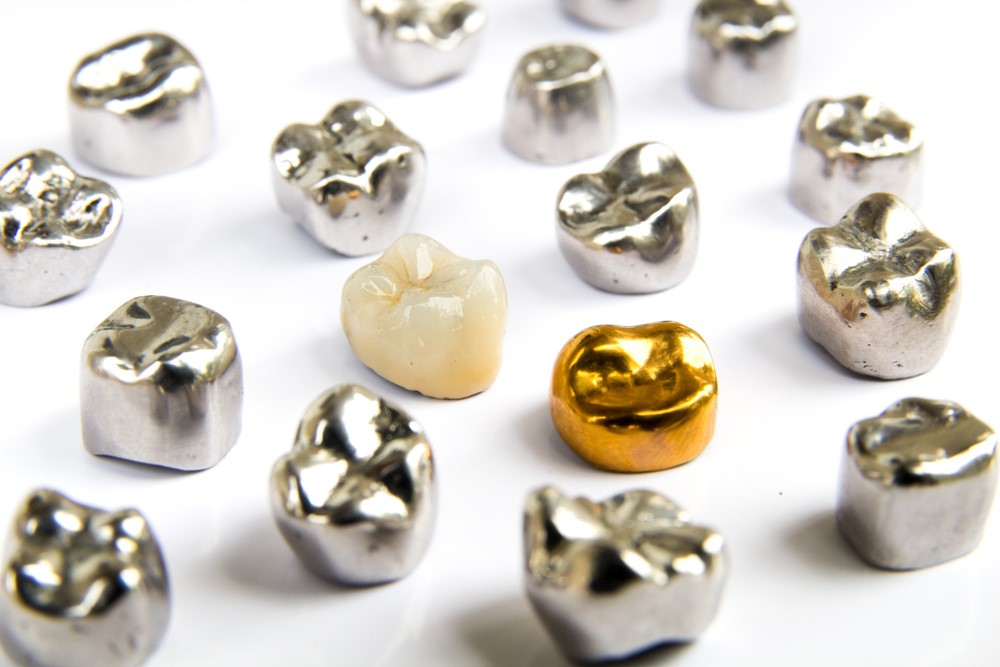
Gum inflammation after crown placement
Surrounding gum sensitivity is common after a dental crown is placed due to irritation from the adhesive.
In most cases, a topical anesthetic gel readily available at most pharmacies will be able to help relieve this, and it is often more effective than oral medications such as ibuprofen.
Tooth pain under crown comes and goes
While a dental crown can effectively cover and protect damaged teeth, many are surprised that it does not prevent tooth pain, as it may cause dental pain.
Teeth that have been covered with a dental crown are just as susceptible to problems as normal teeth.
You may feel discomfort, sensitivity, or pressure as the crown sits fully. Or, you may experience persistent tooth pain.
This may be due to reasons, such as:
- Tooth decay under the crown
- Infections
- A broken tooth or crown
- Grinding of teeth
- The crown does not fit properly.
Permanent crown sensitive to hot and cold
In general, individuals can expect sensitivity to hot and cold for the first week or two after placement. There may also be a lingering sensation of tingling after dental crown placement. This sensation should also subside over time.
If this continues following could be the reasons:
- Gum infection: The gums around your crowned tooth can recede which exposes part of the root. When our roots are exposed, we feel more hot or cold sensitivity after crown replacement.
- Poorly fitted crowns allow food and drinks to pass to the natural tooth beneath the crown.
Ilajak Medical© | A passion for care.




Treatment Services
In the Best Medical Centers
Contact Us
Please fill the form below and describe your condition, We will contact you back
- Dental Treatment
- Hair Transplant
- Obesity Surgery
- Vision Correction
- Health Resorts
- Other Medical Services
- No elements found. Consider changing the search query.
- List is empty.
Your personal data is processed as indicated in the general statement text and by continuing, you explicitly consent to the processing

